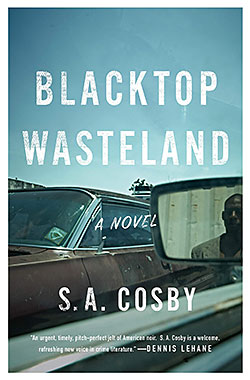 Blacktop Wasteland
Blacktop Wasteland
S. A. Cosby
Fireiron Books, 2020
For those with a passion for crime noir, specifically rural noir (think Daniel Woodrell), there is a new author on the scene whose first novel by a major publisher will blow your socks off. His name is S. A. Cosby; he’s black and from Virginia, which is true of his protagonist Beauregard “Bug” Montage, resident of the fictional Red Hill County. Walter Mosley, of course, is the contemporary black crime writer who has most famously carved his niche in the genre, but Bug is no hard-core detective like Mosely’s urbanites Easy Rawlins and Leonid McGill. In fact, interestingly, there are no detectives, and hardly any police at all, in this novel. Which makes it something fresh and inviting. Bug is just this guy, trying like so many to make ends meet, and having a hard time of it. He’s an ace mechanic who owns his own garage, but now there’s a competitor in town, who can undercut his prices, and so business is slow. Plus, his kids need money for school and braces, the convalescent home where his mother resides needs money or she’ll be kicked out, and he’s three months behind on his loan payment.
Back against the wall – and against his better judgment – Bug hooks up with one Ronnie Sessions, former partner in crime just out of the joint. Ronnie was known for two things: “his twenty-three Elvis tattoos, and stealing anything that wasn’t nailed down with titanium fasteners.” Ronnie has a lead on a shitload of diamonds, so a jewelry heist is planned with Bug as driver.
If you remember “Baby” in one of Kevin Spacey’s last films, Baby Driver, you get the idea of what kind of driver Bug is. He’s a master planner of the getaway and almost superhuman behind the wheel. Much detail is given to the driving, such as how he slams the brakes and hits the accelerator at the same time for certain maneuvers. Just reading about it can give your stomach a flip. Only Bug’s no blond kid; he’s a middle-aged family man.
Thus begins Bug’s double life: model husband, father and business owner on the one hand, and, not for the first time, criminal wheelman on the other. This duality plays out heavily in the novel. Bug’s own father led a criminal life, which, before he split the scene altogether, inadvertently involved his young son Bug in a mess that landed him five years in juvie. And quite possibly gave him a taste for the “life.” Is this really what he’s destined for? It’s a question that runs throughout. At one point, while driving from a job, it is said of Bug:
This was where he belonged. Where he excelled. Some people were meant to pound the keys on a piano or strum the strings of a guitar. A car was his instrument and he was performing a symphony. A coldness filled him. It started
in his stomach and spread to his extremities. He knows no matter what happened
he would never feel more alive, more present than he felt at this moment. There
was truth in that idea and sadness too.
It’s not much of a giveaway to say that the jewelry heist goes awry. What follows, involving lots more driving, is one of the wildest rides in all of literature. Prepare for going into hairpin curves at 90mph and holding your breath while Bug is either chasing or being chased by a cadre of super bad-asses on the blacktop wasteland of the back country highways.
As titillating as all of that is, what is most memorable is Bug’s essential decency. You can’t help but pull for him. He’s someone you’d want for a friend because he’d always be there for you. He may not be sure which world he belongs in, but either one involves a basic code of honor – whether among family or among thieves.
Make way for S. A. Cosby, crime lovers. He’s a force to be reckoned with. J.A.
© 2020 tbr
This review may not be archived, reproduced or distributed further without the author's express permission.
Please see our conditions of use.
The Barcelona Review is a registered non-profit organization